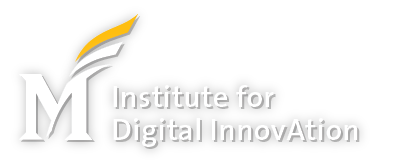Faculty Spotlight: Jiayang Sun 
Jiayang Sun, Ph.D. is a Bernard Dunn Eminent Scholar, Professor of Statistics and the Chair of the Department of Statistics at George Mason University.
The Institute for Digital InnovAtion talked with Sun about the Statistics Collaboration Core (SCC). Responses have been edited.
Tell us about the Statistics Collaboration Core.
The Statistics Collaboration Core (SCC) is a collaboration platform that supports and facilitates statistical collaborations with internal and external investigators or seekers for evidenced-based research, or statistical, biostatistical, or data science support to decision-making. The first partnership discussion started when I moved to GMU in August of 2019 while INOVA Health was also looking for statistical collaboration in the national capital area. With a miracle connection, INOVA Health and GMU Statistics established a STATINOVA partnership via a subcontract supported by the INOVA Heart Cardiovascular Institute and a parent award by the National Center for Advancing Translational Sciences of the National Institutes of Health.
With expanding needs for statistical collaboration from all areas beyond health, the Department of Statistics offers this platform, SCC, to facilitate internal and external communication and support reproducible research in statistical science, data science, and the interdisciplinary areas where statistics is crucial.
The contract supported five of us from GMU Statistics (Drs. Sun, Diao, Vidayshankar, Bagchi, and Scott) in our first phase. As we move on to the third year of this collaboration, we included more junior faculty as it provides excellent collaborative opportunities for them. Currently, Dr. Sun, Dr. Bagchi, Dr. Fadahunsi, Dr. Hunter, Dr. Kepplinger, and Dr. Lee are supported by the contract. They include our fantastic young faculty in the tenure-track line and also excellent Term Assistant Professors interested in doing research.
The partnership has supported writing grant proposals, manuscripts, and publications, designing study protocols and clinical trials, collaborating on a pilot, and extensive EHR studies. We also provided a statistical boot camp, which 89 health and medical professionals participated in during the summer of 2020. We are planning to offer another boot camp soon. Our senior members have also helped mentor INOVA junior investigators, write support letters, and respond to referee critiques.
I am proud of our excellent researchers. The collaboration with INOVA Health has generated additional grants and contracts, promoted original research in statistics and data science, interdisciplinary collaboration, and more.
If there are needs for additional statistical expertise beyond the currently funded core members, the SCC will facilitate a connection with our other faculty in the Department of Statistics, even possibly with other statisticians outside the department, if necessary.
Our mission is to support reproducible research and sound statistical and data science practice.
Our core has a three-dimensional offering: 1) research expertise, 2) collaboration areas, and 3) research, support, and service. We welcome collaboration and support requests for grant applications, manuscripts, conference abstracts, general statistical expertise advice, letters of support, sample surveys, clinical trial and study designs, data analyses, IRBs, referee study critiques on statistics, research in statistics and data science, interdisciplinary collaboration and more. The SCC is distinguished in its capacity for innovation, as well as methodological research. If there are no existing off-shelf methods, we will be glad to develop one as well.
What we don’t do is students’ homework.
What kinds of projects are funded?
We have had projects and grants funded by the NIH, Virginia Department of Health, INOVA, and also a clinical trial approved by the FDA.
How do your projects impact other disciplines?
Our projects with INOVA Health are impacting the health/medical sector. These include the projects on opioids, sepsis, acute kidney injury, cell-free DNA, cardiogenic shocks, dermatitis, protemics + miRNA (a lot of them), heart failure, coronary artery calcium, emergency medicine, pediatrics, nursing, other cardiovascular-related research, and of course, on COVID-19, with at least three projects and publications. For example, in the early days of the pandemic, with INOVA Health we tried to figure out the prevalence of COVID serology among children in Northern Virginia, then the effects of rapid serology tests, and now a healthcare worker COVID-19 study. One of our faculty also represents INOVA-GMU at ithriv.org, the parent awardee.
Independent of this collaboration with INOVA Health and typical statistical methodology grants, I have 25+ years of funded experience in interdisciplinary biomedical research including the treatment and prevention of chronic wounds, cancer epidemiology, neuroscience, surgery, and imaging. I also have worked more broadly on projects that impact environmental science, astronomy, computer science, energy and law. My recent collaborative grants from the NSF, NIH, VA and the CDC included projects on dementia, diabetes, bone crafts, tendon regeneration, and biomarkers for pressure injury risk following spinal cord injury; genes, physiology, and reproductive fitness in high altitude environments; continuous time causal mediation models for social behavior in health; and identification of electronic phenotypes associated with patient health outcomes of interhospital transfer patients.
What projects would you like to be reached out to for potential collaborations?
Pretty much anything that needs statistics and has a good chance to be funded. We have excellent faculty. For folks from INOVA Health, since we have a collaborative contract, they already have direct access to us for any research and work that requires support of statistics and data science. Just visit statinova.gmu.edu.
Personally, I’ve worked with many collaborators; some of these have lasted for decades. I am relatively new at GMU and still learning about the people. In principle, if you can persuade me that something is interesting and fun to do, I will look into it. And if I am not available, I’ll connect you to one of the faculty in our department.
Collaborations don’t have to be restricted to those from INOVA Health. We have a place on our website for these other collaborations. You can send us an email through our website if you’re interested.
We love interdisciplinary work, and we’re open to collaborative research. However, we do not provide free consulting on topics that are not related to a collaboration at this time because we do not have the manpower to do it. The collaboration request is considered on a case-by-case basis and we ask that everyone be aware of the time needed to develop an excellent grant proposal.
What keywords describe your research?
Statistics, biostatistics, data science, data analytics, machine learning, AI, and interface between statistics and computer science.
Big data, heterogeneous, high-dimensional or complex data, text, imaging, or unstructured data, longitudinal and spatial data, clinical trials, study designs, data analyses, statistical computing, algorithms, inference, visualization, and reasoning.
For more details on our expertise and collaboration areas we have worked in, see statinova.gmu.edu/expertise. They range from economics, to astronomy, to dental and medical sciences among others, virtually for any evidence-based policymaking, social and natural sciences.
How does your Core help bring the Mason community together?
We welcome anyone who seeks collaboration with individuals having expertise in statistics and data science.
How can you be reached?
Please contact us through our website at statinova.gmu.edu.

